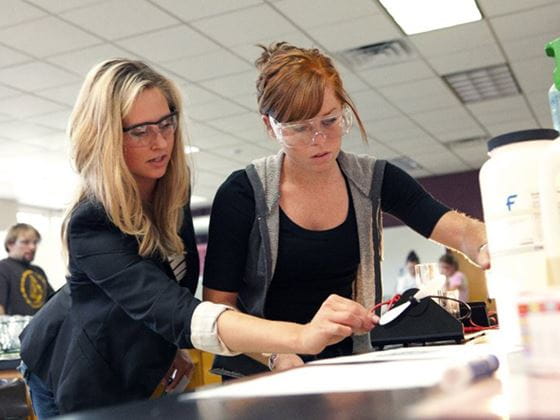-
Program Overview
M.S. in Nursing with a concentration in Nursing Education (33 credits)
Endicott College's Master of Science in Nursing Education program allows students to prepare for the advanced role of nurse educator in either an academic or health care organizations. Nurse educators are responsible for designing, implementing, evaluating, and revising academic and continuing education programs for nurses.
Nurse educators are a critical component in exploring new trends and innovative instructional technology strategies. They also aid in preparing the nursing workforce for the diverse, ever-changing health care environment.
An internship provides the opportunity to integrate knowledge and experience within an administrative environment with a nursing educator. Internship placements are arranged individually through the School of Nursing with your career goals in mind. A capstone project covers the essence, evidence, and excellence of the National League for Nursing (NLN) Nurse Educator Core Competencies.
- 33 credit hour program
- No GRE required
- Accelerated coursework
- 100% online. Courses meet via Zoom every two weeks on a weeknight.
- 18-month completion
- Highly-skilled faculty with real-life experience
- Cohort model that promotes peer support and collaboration
- Personal and accessible advisory support

-
Curriculum
Program of Study
Pre-Master's Pathway Curriculum Requirements - Total Credits Required: 13
The Pre-Master's Pathway is designed for applicants who are registered nurses with an Associate degree or diploma in nursing who have a Bachelor degree or higher degree in a field other than nursing. This option offers alternative methods of qualifying for admission to the Graduate School based on transfer of academic courses and course enrollment. In order to be admitted to the Pre-Master's Pathway, students are required to have completed undergraduate professional nursing courses in nursing leadership, nursing research and concepts/practice in community health. Students may have to submit the course syllabi from other nursing schools for evaluation or enroll in courses at Endicott College to meet these requirements.
Although the Pre-Master's Pathway does not grant a Bachelor degree in nursing, it can enable the student to meet the criteria for admission into the graduate program in nursing. The Pre-Master's Pathway grants exemptions for the specific graduate program admission requirement of a nursing baccalaureate degree.
Once students have been accepted into the program and completed the necessary prerequisites, they will follow the Traditional Master's course work.
If applicable to applicant, the four additional pre-requisite courses are:
-
MTH 126 - Applied Statistics (Cr: 3)
-
NU 306 - Scholarship for the Nursing Discipline (Cr: 3)
-
NU 408 - Leadership and Management in Nursing (Cr: 3)
-
NU 411/411L - Community/ Population Health Nursing (Cr: 4)
Traditional Master's Pathway Curriculum Requirements - Total Credits Required: 15
The Traditional Master's Pathway is designed for registered nurses with a baccalaureate degree in nursing. The common course of study for each specialty includes graduate core courses in theories, research process and design, and contemporary issues and trends that influence nursing practice. The courses follow a detailed sequence needed to develop expertise in each concentration.
-
NUR 503 - Roles and Issues for Advanced Nursing Practice (Cr: 3)
-
NUR 525 - Theoretical Foundations for Advanced Nursing Practice (Cr: 3)
-
NUR 527 - Health Policy & Finance: Application for Advanced Practice Nurses (Cr: 3)
-
NUR 574 - Nursing Research I: Methods (Cr: 3)
-
NUR 575 - Nursing Research II: Project (Cr: 3)
Nursing Education Degree Curriculum Requirements - Total Credits Required: 33
Nursing Education Concentration - 18 credits
-
NUR 505 - Curriculum Design, Course Development, and Program Evaluation (Cr: 3)
-
NUR 506 - Advanced Pathophysiology, Pharmacology, and Health Assessment for the Graduate Nurse (Cr: 3)
-
NUR 561 - Nurse as the Educator (Cr: 3)
-
NUR 565 - Teaching Methods: Principles of Teaching (Cr: 3)
-
NUR 585 - Masters in Nursing Internship in Administrator Role, Educator Role and or Global Health Role (Cr: 6)
Nursing Administration and Leadership Degree Curriculum Requirements - Total Credits Required: 33
Nursing Administration and Leadership Concentration - 18 credits
-
NUR 506 - Advanced Pathophysiology, Pharmacology, and Health Assessment for the Graduate Nurse (Cr: 3)
-
NUR 510 - Organization and Structure of Nursing Leadership (Cr: 3)
-
NUR 526 - Nurse as the Administrator (Cr: 3)
-
NUR 532 - Administration: Practice and Quality Outcomes (Cr: 3)
-
NUR 585 - Masters in Nursing Internship in Administrator Role, Educator Role and or Global Health Role (Cr: 6)
Nursing - Global Health Degree Curriculum Requirements - Total Credits Required: 33
Global Health Concentration - 18 credits
-
NUR 506 - Advanced Pathophysiology, Pharmacology, and Health Assessment for the Graduate Nurse (Cr: 3)
-
NUR 541 - Nurse in Global Health (Cr: 3)
-
NUR 542 - Principles of Global Health (Cr: 3)
-
NUR 543 - Global Health Nursing: Assessment and Evaluation (Cr: 3)
-
NUR 585 - Masters in Nursing Internship in Administrator Role, Educator Role and or Global Health Role (Cr: 6)
Family Nurse Practitioner Degree Curriculum Requirements - Total Credits Required 47
Family Nurse Practitioner - 32 credits
-
NUR 507 - Health Promotion and Disease Prevention for the Advanced Practice Nurse (Cr: 3)
-
NUR 550 - Pathophysiology of Human Disease for Advanced Nursing Practice (Cr: 3)
-
NUR 551 - Comprehensive Health Assessment and Clinical Diagnostic Decision Making (Cr: 3)
-
NUR 562 - Advanced Pharmacotherapeutics for Family Nurse Practitioner (Cr: 3)
-
NUR 566 - Seminar for the Professional Nurse Practitioner (Cr: 2)
-
NUR 567 - Primary Care of the Childbearing Family (Cr: 3)
-
NUR 568 - Primary Care of the Childbearing Family Practicum (Cr: 5)
-
NUR 569 - Primary Care of the Adult and Geriatric Patient (Cr: 3)
-
NUR 570 - Primary Care of the Adult and Geriatric Patient Practicum (Cr: 5)
-
NUR 572 - FNP Clinical Immersion (Cr: 2)
Learning Outcomes
Upon completion of the program, students will:
- Demonstrate advanced clinical judgment based in knowledge from nursing, the arts, humanities, and natural, physical, and social sciences.
- Develop holistic, evidence-based approaches to deliver person-centered care.
- Design quality population-focused care approaches for the protection, promotion, and enhancement of health.
- Design research to address healthcare and nursing issues.
- Create an environment of safety for clients and providers.
- Function as an effective leader of the interprofessional care team.
- Apply knowledge of the healthcare system in leading care across delivery settings.
- Appraise information and communication technologies in the delivery of effective care.
- Integrate the ethics and values of the nursing profession in providing equitable care for all.
- Create an environment that fosters an intentional commitment to personal and professional well-being for all.
View academic catalog and learning outcomes -
MTH 126 - Applied Statistics (Cr: 3)
MSN in Nursing Education at a Glance
18
Month completion
Designed for working nurses to finish at a manageable pace
33
Credits
100%
Online
Flexible and accessible—designed for working professionals

Already Have Your MSN?
Accreditation
The master's and post-masters certificate nursing programs at Endicott College at the Beverly, Massachusetts campus is accredited by the: Accreditation Commission for Education in Nursing (ACEN). 3390 Peachtree Road NE, Suite 1400 Atlanta, GA, 30326.
The most recent accreditation decision made by the ACEN Board of Commissioners for the master's and post-master's certificate nursing programs is continuing accreditation. View the public information disclosed by the ACEN regarding this program on the ACENwebsite.


